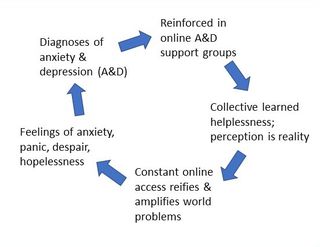Anxiety
Young, Anxious Minds Online All the Time
Is Generation Z stuck in a sickening and self-defeating feedback loop?
Posted May 8, 2020

In my last post, I explored the question of why Gen Z suffers from record-breaking rates of anxiety and depression when all generations have been tested by war, violence, social inequality, racism, substance abuse, poverty, economic uncertainty, environmental decline, competition for jobs, etc. And I reported that my first-year writing students far and away identified the negative influences from social media as the culprit for their poor mental health.
But several commenters rejected that notion even when I described it as an "addiction," which is what it feels like when only strictly enforced rules champion the teacher over the phone in the classroom. In a Global News series on Canada’s Gen Z population, Marilisa Racco suggests we ditch the addiction metaphor and instead consider Gen Z’s cellphones as “an extension of themselves,” which does seem to more accurately capture the relationship between adolescents and their lives online.
But if not social media, then what? Many commenters highlighted the high cost of college, terrorism, abusive households, social inequality, poor leaders, and climate change. But many of these are problems that have been around for decades, if not forever, so I’m not convinced it makes sense for Gen Z to cite them as the reason for their mental health crisis.
Moreover, Gen Z’s citing any world problem (or all of them) as the reason for their crisis is weird, because it suggests these problems are theirs alone as if they have no history, which, incidentally, discredits the work of older generations who’ve made progress in these areas. A few commenters acknowledged that some problems have been around a long time, but argued that they’ve gotten worse. Likely. And some have gotten better.
But are problems specific to generations?
1. Though I’ve used in this post and the one before it the language of different generations and their characteristics, which suggests they’re somehow distinct, they are, nevertheless, coexistent. So, it makes sense to say my parents are Boomers, I’m a Gen X’er, and my students are Gen Z because we’re in different age groups. But...
2. The "distinct yet coexistent" point is really important here: Gen Z is rightfully concerned about the environment, but they’re not the only ones. Green Peace, Earth First!, and PIRGs were dedicated to the cause long before Gen Z was a twinkle in anyone’s eye. The environmental decline over the past few decades has been severe and impacts everyone on this planet; we’re all responsible for managing climate change right now.
3. Even if it were true that the problems of 2020 were, in fact, the worst ever, or at least worse than they used to be, and this was a sufficient cause for a staggering rise in anxiety and depression, then wouldn’t we expect to see this trend across all generations? But we’re not. Moreover, wouldn’t it make sense that older generations who had witnessed these problems worsen over time—sometimes in direct opposition to their efforts—would be more likely to suffer a generational nervous breakdown?
I’m not really saying that Gen Z is wrong or deluded in believing they face the worst problems in human history. It’s more nuanced than that. Some problems have gotten worse—student loan debt has gotten ludicrous, for example. But in general, the world’s Big Problems don’t tend to be unique to any one generation; they’re a shared burden. Consider too the idea from psychology that “perception is reality.” Gen Z can believe its problems are the worst, and Millennials can believe theirs were. No one has to be right here. There are no winners in this contest.
I tend to take the long view, I mean, the really long view: When we think about human evolution, we can imagine how each new problem thrown at us by the natural world, by our own (over)active minds, or by other humans likely seemed insurmountable until we overcame it or accepted it and evolved on. It’s possible that each generation of humans (whether we’re talking on a 25-year or 25,000-year scale) could have believed its problems were impossible. And yet, here we are.
Also, consider the aspect of novelty: While we’ve been familiar with the world’s problems for a long time, Gen Z is encountering all of them for the first time. In fact, it’s hard for Gen Z to escape them, given their constant connectivity.
When new problems arise, they can seem insurmountable—Exhibit A: COVID-19. Whose problem is that? Everyone’s. And who’s working to combat it? Scientists and health care professionals who, thanks to decades of education, experience, and training, have collectively risen to the occasion.
At least a few Gen Z readers seemed adamant about their generation having the worst problems, which I hope is a minority view because if it were true, what then? Most of these young people identify with psychological diagnoses that, in effect, justify their feeling overwhelmed by their feelings about life. How would this already severely struggling generation rise to the occasion to combat what they report as being some of the most serious problems humanity has ever faced?
I think there’s a better, more hopeful way to think about all this.
Gen Z might unwittingly be stuck in an unhealthy and self-defeating positive feedback loop. A positive feedback loop is one wherein the elements reinforce one another to keep it going in a potentially endless cycle. Positive feedback loops also tend toward instability because the perpetual cycling amplifies small effects.
It seems Gen Z perceives the problems facing its generation as uniquely bad, and that, given the social conditions under which they were raised, this causes them extreme stress, which leads to feelings of anxiousness, despair, and despondency, which makes it harder to take on life’s small challenges, let alone the world’s Big Problems. This anxiety-driven inertia invites diagnoses, which are then validated by a generational belief that they’re faced with uniquely bad problems.
If Gen Z is stuck in this loop (see figure above), it’s not of their own doing, and from what I’m hearing, they hate being in it.
As Ash (a commenter on the last post) put it: “It seems we have improved diagnosing mental health issues, yet the functional outcomes seem worse rather than better. One has to wonder if being labeled with a DSM diagnosis of PTSD, anxiety disorder, etc. actually leads to a path of management and overcoming, or if it allows stagnation at the level of illness.” Right. In an effort to help, we diagnose and medicate. The result? A generation of kids diagnosed with feeling overwhelmed by the world’s problems and incapable of taking them on.
Do I believe that Gen Z is truly incapable of taking on the world? No, but the diagnosis-crazy and meds-happy 21st century might unintentionally lead kids to believe they are.
An important element in the feedback loop is Gen Z’s fluency with cellphones and social media. Whereas we used to have to seek out the news on TV or in newspapers, now it’s “an extension” of their being in the world. They’re constantly bombarded with soul-sucking news about the world, a continual stream of information, lots of it bad, hitting their brains, and punching them in the gut.
Being anxious is a natural, evolutionary reaction to being tuned in (and especially overly tuned in) to what’s out there. Add to this toxic soup social media rants and insults, and the new psychological phenom of “FOMO” (fear of missing out—the anxiety peculiar to seeing online evidence of others having fun without you).
This feedback loop hypothesis might begin to demystify, for older generations, Gen Z’s predicament. Some preliminary observations:
1. I believe my students were on to something when they homed in on the negative influences of social media in their essays. But I agree with the commenters who pointed out that there’s more to it than that; social media might exacerbate their psychological burdens, but they’re not the cause of them.
2. There’s a well-established system in place to help people who are struggling with psychological and emotional issues, as there must be in any humane society. Yet, it’s possible that Gen Z was diagnosed-and-medicated before they had a chance to figure out why or have any say in it. When you take the really long view (which can be immensely helpful in putting things into perspective), you recognize that humans have always suffered and overcome problems. I think Gen Z kids are capable of prevailing on their own but have been robbed of that opportunity.
3. Gen Z can regain some sense of control as they learn which social media platforms are intended to entertain or titillate, but ultimately drag them down, and which are intended to inform, educate, and elevate human nature. On this one—go with your gut. Lots of students have admitted to me how terrible they feel after spending time on this or that social media platform. I know what I’d do if I had an account. And it’s not just quality; it’s quantity. One student of mine wrote an essay about her social media cleanse. She loved the effects, and her family did too.
The feedback loop I’ve described here is an abstract conceptualization of (my take on) Gen Z’s mental health crisis. There are no data to support this feedback loop hypothesis, and it’s not an empirical thesis that can be tested. (But you heard it here first!) It’s a theoretical tool that might help us connect what we already know with what we want to understand. I remember soon after 9/11, psychologists were urging parents to limit their children’s exposure to the horrifying images of the planes hitting the World Trade Center. I didn’t own a TV at the time and only saw the now-famous photo two days later in a newspaper. Once was enough. It’s not a stretch then to understand how Gen Z’s incessant consumption of disturbing news and images online amplifies their anxiety, which justifies their diagnoses, and so on and so forth…
The unhealthy loop Gen Z is stuck in is making them sick. Helping them escape the loop and become healthier and happier is another example of a problem that cuts across all generations.
References
Racco, M. (2018, June 19). Is Generation Z Glued to Technology? ‘It’s Not an Addiction, It’s an Extension of Themselves.’ Global News. Retrieved from https://globalnews.ca/




